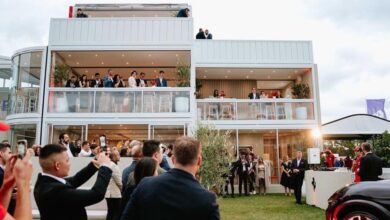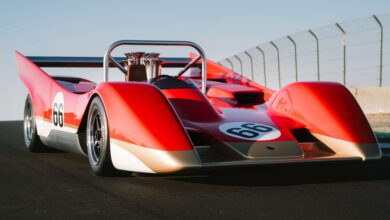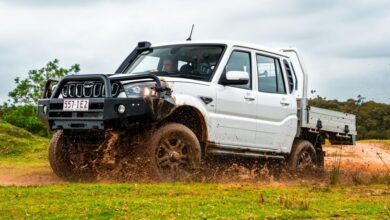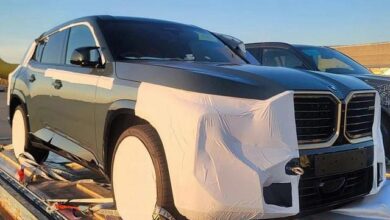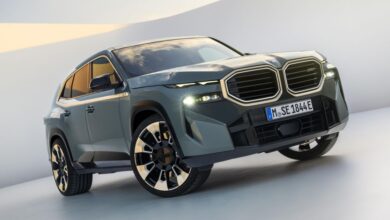Mitsubishi Pajero EVC – JKR’s EV conversion detailed
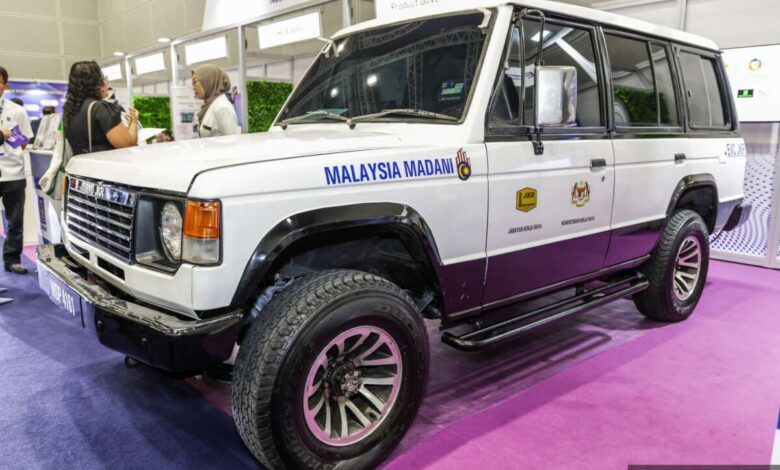
The just concluded International Electric Mobility Showcase held in KLCC had no shortage of displays centred around electrification, but none stood out quite like this one did, simply because it looked quite out of place amidst all the modern elements on call.
Your eyes do not deceive you. That’s a 1994 Mitsubishi LO49 Pajero, and a public works department (JKR) unit at that. Decked out in a yellow and grey exterior scheme in the past, the vehicle used to be a common sight in the 90s. Of course, more than three decades on, it is now nothing more than a legacy, of a time gone by.
So why then was this particular vehicle on show at the National EV Pavilion area of the event? Well, that’s because it’s an electric vehicle, or rather one converted into an EV by the department. It’s actually the second such vehicle of the type to undergo the conversion into an EV, the first being a low-powered proof of concept exercise with a 1993 Pajero back in 2021, the entire project being completed in 41 days.
This one, known as the JKR EVC 2, scales the tech up, essentially commissioned to answer a few questions, from gleaning in-depth knowledge about conversion aspects to looking at the viability of converting the government’s fleet of old internal combustion engine (ICE) vehicles to electric ones. As it turns out, the project has also helped to define policies, providing valuable information for the EV conversion (EVC) guidelines being drafted by the road transport department (JPJ).
Some notes about the Pajero EV. Its diesel mill has been replaced by a 90 kW (120 hp) permanent magnet synchronous reluctance motor which offers around 60 to 65 kW of maximum continuous output and 235 Nm of twist. With power sent to the rear wheels, the EVC 2 has a maximum speed of 120 km/h and accomplishes the 0-60 km/h run in 17 seconds.
The electric motor is juiced by a 58.36 kWh LiFePo4 (lithium iron phosphate or LFP) battery, which offers the EVC 2 a maximum travel range of 200 km. Charging is via AC only, with a 6.6 kW onboard charger getting the battery from a zero to 90% state of charge in around eight hours.
The battery, which sits at the rear of the vehicle, weighs 400 kg, essentially making it a like for like replacement for the discarded engine and other hardware at the front, with the weight being redistributed to the back of the car. There’s around 75 kg of additional weight, brought about by electrical components (motor, inverter, DC-to-DC converter), and the suspension has been suitably modified.
Work on the car began on September 12 last year, with the project involving a number of parties, including JKR’s mechanical and electrical department teams as well as those from collaboration partners EMAR Technology, UniKL, BateriKu, Vector Labs and Celcom.
Initial work – from October to December – consisted of the removal of the Pajero’s engine and doing up the bodywork, including painting the car. During the same period, procurement of hardware and layout design was undertaken, and from March to mid-June, component installation and system integration work was carried out, with running trials beginning after that.
Incidentally, though it is a prototype, WDP 4161 is fully road-legal, with the department being given a two-year approval to run the vehicle as a R&D testbed by the JPJ. Interestingly, the road tax – which is of course zero – for the EVC 2 is vaild all the way to 2027, suggesting that road legality for it could extend all the way to then. EV conversions are currently not legal but authorisation can given by the JPJ in special cases, such as for demonstrators or testing.
While interesting, the initiative to convert the Pajero is also intriguing, given that the department is associated with the construction of roads and government infrastructure, and EV conversions are well off the scope for it. Why then, was the question posed to Megat Zuhairy Megat Tajuddin, former engineering director of JKR, the man behind the electric Pajero.
“Why is JKR making conversions? Everyone thinks JKR builds roads and government buildings and infrastructure. Yes, that’s our core business, but one of our roles is also maintaining the government fleet, and given the country’s aim of working towards a low-carbon footprint, it is only natural to look at ways to electrify the government’s vehicle fleet,” he said.
“Back in 2021, the department was asked to see how it could assist with that aim. From the JKR perspective, I thought of how we could improve the infrastructure of providing EV chargers in government buildings or in areas involving public roads,” he said.
At that point, Megat said he needed an EV to understand the requirements. “I did not have the budget to buy a new car, but we found several partners, one of which was looking into EV conversions, and so we decided to explore that avenue,” he said. As for the choice of the Pajero, it was pretty much ordained. “When I requested a vehicle for conversion, the JKR workshop handed a list of old Pajeros that it was willing to provide for the project,” he explained.
While it started off as an exercise to deliver an EV for determining infrastructure requirements, the project quickly became larger than the vehicle, evolving into an aim to make sure that EV conversions were viable and feasible in Malaysia. “Although it started out as an internal project, we have now been called to be part of the national EV initiative as a member for process and procedure,” he said.
Besides aiding the establishment of conversion guidelines, he said it has also opened the road for new opportunities, especially for the country. “One is that in order to carry out conversions to required regulations, it is necessary to ensure that those who are doing that work are competent,” he stated.
As such, training becomes crucial, and so the idea is to eventually establish certification for workshops, starting with JKR’s own workshops. “This will provide a model or reference for any new EVC workshops in the country, private or public,” he said. He added that conversions would also benefit local component manufacturers, as parts will surely be needed for the activity.
The cost of the Pajero conversion? Around RM150,000, which doesn’t make for a good business case, but with scale this can easily be halved and eventually trimmed further, Megat explained. “Of course it has to have economies of scale. Doing one is not feasible, but go into thousands and it will adjust. The larger picture is how it will benefit local component manufacturers,” he said.
Looking to sell your car? Sell it with myTukar.





